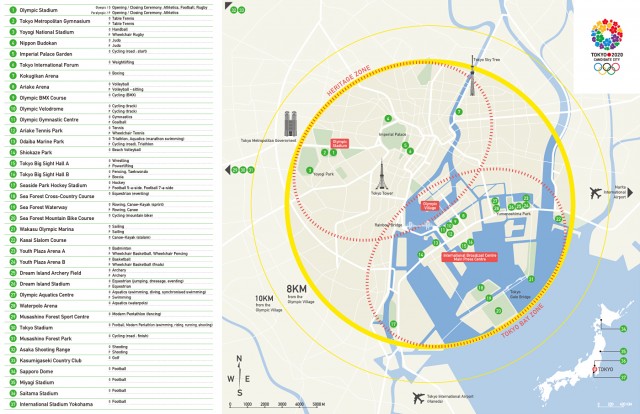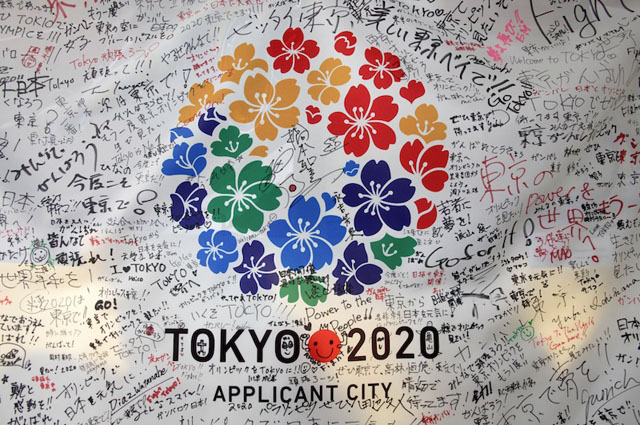As the race for the Games nears its end, we examine the competitors the Tokyo 2020 Olympic bid hopes to sprint ahead of and ask: have the team done enough to win next month’s vote in Buenos Aires?
by Henry Watts
On September 7 in Buenos Aires the International Olympic Committee (IOC) will announce the winning candidate city as host for the 2020 Olympic and Paralympic Games from between Madrid, Istanbul and Tokyo, in what will be either a second consecutive failed bid by Tokyo, or a glorious return of the summer Games to Japan for the first time since 1964.
Following the IOC inspections in Tokyo this March and a presentation to IOC members in Lausanne, Switzerland, in July, the Japanese Olympic Committee (JOC) has now done nearly all the campaigning and ingratiating it can. As clichéd as it sounds, the race is pretty tight. The IOC’s Evaluation Committee has said (albeit predictably) that “each one of the candidate cities could host perfect Games”, with veteran IOC member Dick Pound saying it was genuinely the closest race he could remember – partly because “all the bids had obvious strengths and weaknesses.”
The Tokyo 2020 Olympic Bid
“Discover Tomorrow”
70% public support (67% in wider Japan)
Strengths
The biggest strength of the Tokyo 2020 Olympic bid is in its apparent ability to deliver a well-funded, safe and secure Games without any of the instability saddling the other two bids. In a technical IOC report released in June, Tokyo was noted for its capital reserves as well as for being “a modern, dynamic city” with “one of the most modern and efficient” transport systems in the world. And the IOC can be pretty sure there will not be any protesting in Tokyo.
Referring to the failed 2016 bid, the Tokyo campaign team has said it aims to “keep the best and improve the rest”. Thus it has continued to boast about its ability to hold “an environmentally cleaner event in a compact area”, as well as its being “a world leader in anti-doping” that can offer a model of “clean sport”. The latter will hold particular sway for IOC members given recent revelations, with sprinters Tyson Gay, Asafa Powell and Veronica Campbell-Brown having failed tests for banned substances in recent weeks.

Venues that form part of the Tokyo 2020 Olympic Bid. Click to enlarge. (Image courtesy of the Japanese Olympic Committee)
The bid also addresses IOC concerns from 2007 about whether there would be enough space by planning to build the Olympic Village – in Harumi, Chuo ward – about 13 hectares bigger than that proposed for 2016. The Village has been praised also for its proximity to the sporting venues; it is within 8km of 28 of the 35 proposed sporting arenas. Public support for the Games has also risen from only 56 percent in 2007 – a big issue for the bid then – to 70 percent this year.
Weaknesses
While public support has increased in more recent polls, there does seem to be a lack of any deep enthusiasm to host the Games. When the IOC polled Tokyoites in May, the support rate was only 47 percent, versus 78 percent in Madrid and 73 percent in Istanbul. One reason for this might be because, as one commentator at the Lausanne presentations said, the bid “lacks a compelling back-story and is, to put it bluntly, a bit dull”.

Zaha Hadid’s proposed Olympic Stadium in Tokyo (click to view larger image) Image: Japan Sport Council/Japan Olympic Committee
“The bid ‘lacks a compelling back-story and is, to put it bluntly, a bit dull.'”
At the presentations in Lausanne, Deputy Prime Minister Taro Aso spoke of how the Olympics was a chance for Japan to show the world it has stood up and recovered from the disaster that afflicted it in 2011. While this is no doubt true, appealing to the misfortunes of those in Tohoku and Fukushima to bring the glitz of the Olympics to Tokyo is, to say the least, a little cheap. It is, nonetheless, very much a feature of the Olympic Movement and commercial sports more generally to affix messages of worth and virtue to the actions of athletes, and thus it might not be enough for Tokyo simply to be ready and well-organised for the Olympics.
The Madrid 2020 Bid
“Illuminate The Future”
76% support (81% in Spain)
Strengths
Largely counted out in the early stages of the campaign on account of its crisis-hit economy, Madrid is now a serious contender, following an impressive performance at the presentations in Lausanne last month in which Crown Prince Felipe – a former Olympic sailor – gave an apparently illustrious speech. Dick Pound of the IOC weighed in again: “If you’re grading performance, Madrid did the best in terms of the message and delivery of it,” he said. “The star of the day was the prince. It was his content, his delivery, his genuineness.”
Dick Pound of the IOC weighed in again: ‘If you’re grading performance, Madrid did the best in terms of the message and delivery of it.’
The glamour the Spanish heir brought to the presentations contrasts with the low-cost, no-risk message his team’s bid represents – “a realistic bid for realistic times,” they say – in what looks like an Olympics for austerity and the economic zeitgeist. A relatively low budget is feasible in the main because 80 percent of the facilities are already built.
Weaknesses
The team has tried hard to present itself as financially capable of hosting the Olympics with a very small budget, but it is hard to understate the crisis the Spanish economy has been in for the last five years; it very nearly joined the gang of damned European economies that needed a bail-out, has seen continuous anti-government protests in response to deep austerity cuts and has 27 percent unemployment.
Given the fragile economy, one could hardly say there was “no-risk” in the IOC investing in Madrid. It remains to be seen whether members will give Spain the leg-up it, and the Eurozone, needs, which, given the doubts over the Brazil World Cup in 2014 as a result of widespread protests against bad government priorities, might not be what the IOC wants.
Another troublesome area for Madrid is IOC president Jacques Rogge’s hinting at giving more equity between continents, which would seemingly now disadvantage a European bid. Oh, and Madrid surely has the worst logo of the lot…
The Istanbul 2020 Bid
“Bridge Together”
83% support (76% in Turkey)
Strengths
Turkey presents the IOC’s best opportunity to take the Olympic Movement to previously unchartered territory.
The Istanbul team claim Turkey can “foster global understanding and inclusiveness by being the first secular Muslim country to host the Games”. Though its secularism has been on the wane of late, the more idealistic members of the IOC could well see a chance in Istanbul to use the Games to transcend and perhaps even mitigate perceived clashes of civilizations, with and within the Middle East.
The Istanbul team claim Turkey can ‘foster global understanding and inclusiveness by being the first secular Muslim country to host the Games’.
Given that Turkey’s economy is now one of the fastest growing in the world, Istanbul is more ready than it has been in any of its five previous bids. Transportation infrastructure and sports facilities are still relatively under-developed, but the campaign team have done well to show how the Olympic Movement can leave a lasting legacy with these investments, particularly for the region’s young people.
Weaknesses
Earlier this year, the IOC might just have considered giving Turkey the benefit of the doubt over security concerns. Now, however, security seems very much to be Istanbul’s elephant in the room, as well as, surely, Prime Minister Tayyip Erdoğan’s ham-fisted attempts to quash nationwide protests.
The force of Erdoğan’s government against what started out as small, peaceful protests has ignited the public and broadened the criticism against him, but the protestors initially demanded only to stop the demolition of Gezi Park – one of Istanbul’s few remaining green spaces – for redevelopment; all this, of course, before large-scale construction for the Olympics has even begun.
The IOC would surely not wish for the Olympics to add to the grievances of the people of Istanbul, as the 2014 World Cup has for many Brazilians. More risk-averse IOC members may, therefore, opt for Tokyo.









